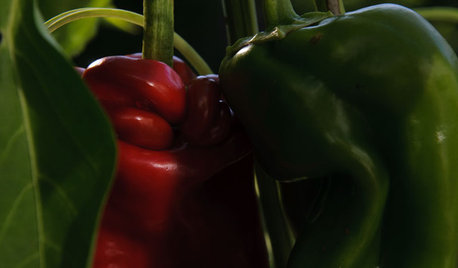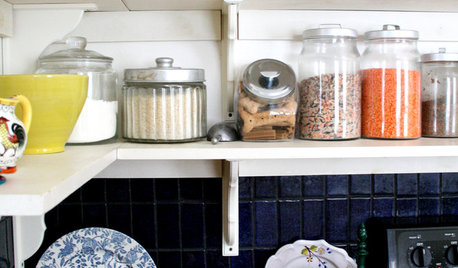Hot Pepper Potting Mix
nick032
10 years ago
Related Stories

GARDENING GUIDESSummer Crops: How to Grow Peppers
Some like 'em hot; others like them sweet. With the incredible range of peppers available for home gardens, you can have your pick
Full Story
DECORATING GUIDESDesign Details: Pepper a Space with Poufs
Keep Cushy Seats On Hand for Unexpected Guests and Casual-Chic Style
Full Story
DECORATING GUIDESGreat Color Palettes: 8 Hot Bedroom Color Schemes
Go spicy, mild or a mix of both with warm and cozy hues in your bedroom
Full Story
KITCHEN DESIGNDisplaying Kitchen Supplies — Hot or Not?
Do some kitchens just beg for a cozy row of canisters and gear for all to see? Have a look and let us know what you think
Full Story
ORANGE7 Spicy Hot Color Palettes to Fire Up a Living Room
Hues on the fiery end of the spectrum can add spark and intensity to living room walls, furniture and accent pieces
Full Story
GARDENING GUIDESVegetables and Flowers Mix in Beautiful Edible Gardens
Ornamentals, meet your edible garden mates. We know you'll get along just beautifully
Full Story
KITCHEN DESIGNNew This Week: 2 Kitchens That Show How to Mix Materials
See how these kitchens combine textures, colors and materials into a harmonious whole
Full Story
KITCHEN DESIGNMix and Match Kitchen Materials for a Knockout Design
Give your kitchen unexpected flavor by combining wood, stone, glass and more. Here’s how to get the mix right
Full Story
BEFORE AND AFTERSMixing Vintage and Modern in an Urban Family Kitchen
See an ad hoc kitchen become full of character, hipness and — above all — function
Full Story
ECLECTIC HOMESHouzz Tour: High-Low Mix in a Colorful Victorian
An unloved house is transformed into a cheerful, versatile home with a blend of design classics, budget pieces and treasured finds
Full StoryMore Discussions







Okiedawn OK Zone 7
nick032Original Author
Related Professionals
Richmond Heights Landscape Architects & Landscape Designers · Westwood Landscape Contractors · Cudahy Landscape Contractors · East Hanover Landscape Contractors · Fairfield Landscape Contractors · Galt Landscape Contractors · Longmont Landscape Contractors · Nashua Landscape Contractors · Pleasanton Landscape Contractors · Shaker Heights Landscape Contractors · Vermilion Landscape Contractors · Braintree Decks, Patios & Outdoor Enclosures · Conroe Decks, Patios & Outdoor Enclosures · Highland Springs Decks, Patios & Outdoor Enclosures · Rosemont Decks, Patios & Outdoor EnclosuresOkiedawn OK Zone 7
nick032Original Author